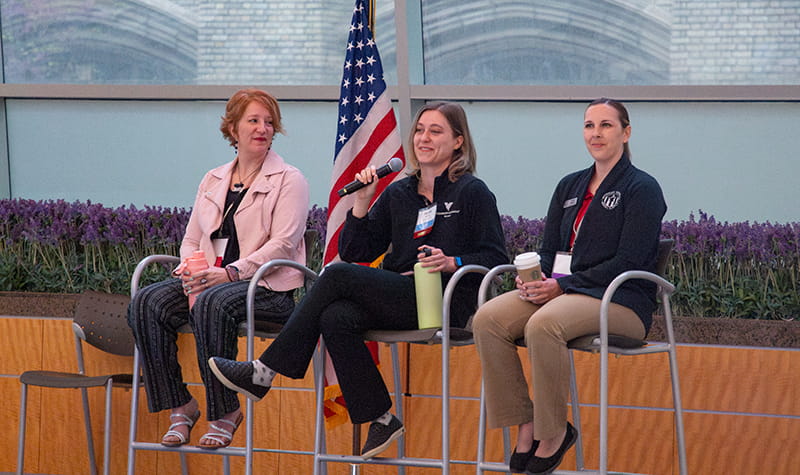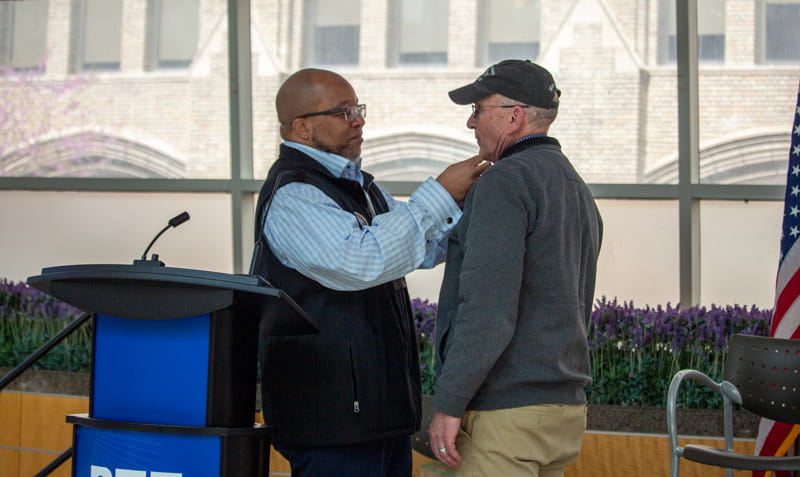The web Browser you are currently using is unsupported, and some features of this site may not work as intended. Please update to a modern browser such as Chrome, Firefox or Edge to experience all features Michigan.gov has to offer.
Third Michigan Veterans Leadership Summit gives service providers ways to collaborate on how best to serve Michigan veterans
May 03, 2024

(Left to right) Jennifer Tuzinsky, Built for Zero / Coordinated Access Model; Diandra Gourlay, Volunteers of America; Cassie Weston, MVAA
More than 200 military veteran leaders and advocates across Michigan and the nation met May 2-3, at DTE Energy headquarters in downtown Detroit to discuss challenges the more than 550,000 Michigan veterans face and collaborate on new and better ways to serve them, their families and their caregivers. The third annual Michigan Veterans Leadership Summit was hosted by the Michigan Veterans Affairs Agency (MVAA) in collaboration with veteran stakeholders from across the state.
Keynote speaker and Michigan native, Major Jonathan Turnbull, escorted by his wife, Sam Turnbull, shared his experience as a service member in the U.S. Army. Turnbull enlisted in 2005, and served in Afghanistan, Jordan, Lebanon, Iraq and Syria. On Jan. 16, 2019, Turnbull and his team, while performing a wellness check on a school to ensure local girls were being allowed to attend classes, encountered a suicide bomber who detonated their vest. Four were killed, including three American service members and the interpreter. Three American service members were seriously injured, including Turnbull, who suffered severe damage to his face and lost his right eye. Turnbull has undergone 22 surgeries and spent two years in Walter Reed National Military Medical Center. In honor of his fallen teammates, Turnbull penned a memoir, Zero Percent Chance: A Tribute to the Heroes of Cross-Functional Team Manbij. Medically retired and blind, Turnbull admitted to using humor to help him cope with his experience and put others at ease.
Attendees had questions for speakers from the U.S. Department of Veterans Affairs (VA) S.A.V.E. program, Mental Health First Aid and the Michigan Department of Health & Human Services (MDHHS) on their suicide prevention efforts and mental health resources available for Michigan veterans.
The summit featured a panel discussion about emergency services for Michigan veteran residents that included the Michigan Veterans Trust Fund, MDHHS, the National Guard Association of Michigan and UP Services and an update about community care from the Saginaw VA Medical Center.
The VA’s Chief Veterans Experience Officer, John Boerstler came from Washington D.C. to share the improvements to services the VA has made by using human-centered design. Boerstler noted the fastest growing demographic in veteran healthcare and services is women veterans meaning the healthcare industry, including the VA, must pivot and tailor their care to focus on the needs of those women veterans.
Thursday afternoon, Tiffany Carr and Ryan Engle from the Michigan Veteran Homes discussed the three long-term care facilities for Michigan veterans: Grand Rapids, Chesterfield Township and D.J. Jacobetti in Marquette. Carr and Engle provided attendees with an update on the construction of a new D.J. Jacobetti facility. The current building, the former St. Mary’s Hospital, was built in 1954 and acquired by the State of Michigan in 1981 to be used as a veteran home. Although the existing facility has been a great asset to veterans and their families, at nearly 70 years old, many critical infrastructure systems have reached the end of their useful lives and does not allow for a contemporary home-like approach to skilled nursing care.
Andre Logan and Richard Munoz from the Great Lakes National Cemetery in Holly discussed burial options, eligibility criteria, the cemetery’s history and the Veteran Legacy Program. Munoz encouraged attendees to visit the Great Lakes National Cemetery and to volunteer at their local cemeteries to clean headstones.
Wrapping up the first day of the summit, was Dr. Qwynn Gallaway-Salzar, the founder and CEO of In Their Honor and an end-of-life doula. An Army veteran, Gallaway-Salazar has devoted more than two decades of her career to elevate the quality of life of those in the military and veteran communities. She shared the need for being present for those at the end of their lives and how especially important it is do show up for our veterans at the end of their lives. “We [veterans] die differently, ya’ll,” said Dr. Gallaway-Salazar to attendees, meaning that veterans have different experiences, traumas and triggers that can surface at the end of their lives. Ensuring that no veteran dies alone, gives them the opportunity to feel heard, but more importantly, to be seen.
Just before dismissing for the day, MVAA Director Brian L. Love officially welcomed home two Vietnam War era veterans, U.S. Navy veteran Richard Higgins, and Air Force veteran Murry Davis by pinning them with a commemorative pin and thanking them for their service to the nation.
Friday morning, the summit kicked off with an in-demand topic in the veteran space: homeless veterans initiatives and challenges. MVAA’s Erika Hoover facilitated the panel with experts from Volunteers of America, Built for Zero and a fellow colleague from MVAA. Fielding a variety of questions from attendees for nearly an hour, the conversation provided program information, alternative resources and challenges to finding and securing permanent housing.
The final session of the Michigan Veterans Leadership Summit was a legislative panel that included State Rep. William Bruck, State Rep. David Martin, State Sen. Veronica Klinefelt and State Sen. Sarah Anthony. The legislators shared what legislation they are currently working on that will impact the lives of Michigan veterans and their families and took questions from the audience.
The sponsors for the 2024 Michigan Veterans Leadership Summit included DTE Energy, Detroit School of Digital Technology, Michigan Veterans Trust Fund, Vietnam Veterans of America Chapter 9, Vietnam Veterans of America State of Michigan Council, Alliant Healthcare Group and the West Michigan Veterans Coalition.






